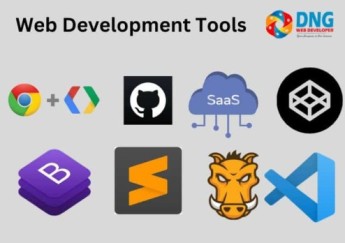Web development tools are essential for developers, enabling them to create, test, and maintain websites and applications efficiently. This article provides an overview of various categories of web development tools, their significance, and popular options within each category.
1. Integrated Development Environments (IDEs)
IDEs are comprehensive software applications that provide developers with tools for writing and editing code, debugging, and managing projects. They enhance productivity by offering features such as code completion, syntax highlighting, and version control integration.
Popular IDEs:
- Visual Studio Code: A free, open-source code editor with a rich ecosystem of extensions, perfect for various programming languages.
- Atom: A customizable text editor developed by GitHub, suitable for web development and supports numerous plugins.
- WebStorm: A powerful IDE specifically designed for JavaScript and front-end development.
2. Code Editors
Popular Code Editors:
- Sublime Text: Known for its speed and simplicity, with features like split editing and a powerful command palette.
- Notepad++: A free text editor with support for multiple languages and customizable syntax highlighting.
- Brackets: An open-source editor that provides a live preview feature, ideal for front-end developers.
3. Version Control Systems
Version control systems help developers manage changes to source code over time, allowing collaboration among team members and tracking revisions.
Popular Version Control Systems:
- Git: The most widely used version control system, enabling distributed version control and collaboration.
- GitHub: A web-based platform that hosts Git repositories, facilitating code sharing and collaboration.
- GitLab: Similar to GitHub but with integrated CI/CD capabilities, allowing for streamlined development workflows.
4. Frameworks and Libraries
Web development frameworks and libraries provide pre-written code to simplify the development process, enhancing productivity and consistency.
Popular Front-End Frameworks:
- React: A JavaScript library for building user interfaces, developed by Facebook, known for its component-based architecture.
- Angular: A TypeScript-based framework developed by Google for building dynamic web applications with a focus on single-page applications (SPAs).
- Vue.js: A progressive JavaScript framework for building UIs, known for its flexibility and ease of integration.
Popular Back-End Frameworks:
- Node.js: A JavaScript runtime built on Chrome’s V8 engine, enabling server-side development with JavaScript.
- Django: A high-level Python web framework that encourages rapid development and clean, pragmatic design.
- Ruby on Rails: A web application framework written in Ruby, emphasizing convention over configuration and making it easy to develop database-backed applications.
5. Database Management Systems
Database management systems (DBMS) are software applications that facilitate the creation, management, and interaction with databases.
Popular DBMS:
- MySQL: An open-source relational database management system widely used for web applications.
- PostgreSQL: A powerful open-source object-relational database system known for its advanced features and extensibility.
- MongoDB: A NoSQL database designed for handling large volumes of unstructured data, often used in modern web applications.
6. Testing Tools
Testing tools help developers identify bugs and ensure the quality of their web applications through automated and manual testing.
Popular Testing Tools:
- Selenium: A widely used framework for automating web browsers, enabling developers to write functional tests for web applications.
- Jest: A JavaScript testing framework developed by Facebook, primarily used for testing React applications.
- Postman: A tool for testing APIs, allowing developers to send requests and analyze responses easily.
7. Browser Developer Tools
Most modern web browsers come with built-in developer tools that help developers inspect elements, debug code, and monitor network activity.
Popular Browser Developer Tools:
- Google Chrome DevTools: A suite of web developer tools built directly into the Google Chrome browser, offering features like real-time editing and performance monitoring.
- Firefox Developer Tools: Similar to Chrome DevTools, with unique features like CSS Grid layout inspection and accessibility checks.
- Safari Developer Tools: Built-in tools for inspecting and debugging websites in the Safari browser, useful for testing on Apple devices.
8. Task Runners and Build Tools
Task runners and build tools automate repetitive tasks such as minification, compilation, and testing, streamlining the development workflow.
Popular Task Runners and Build Tools:
- Gulp: A JavaScript-based task runner that automates tasks such as file manipulation and code optimization.
- Grunt: A task runner that allows developers to configure tasks through a simple JavaScript file, useful for automation.
- Webpack: A module bundler that compiles JavaScript modules and assets, optimizing them for production.
9. Content Management Systems (CMS)
CMS platforms enable users to create, manage, and modify content on websites without extensive coding knowledge.
Popular CMS:
- WordPress: The most popular CMS, known for its flexibility, ease of use, and a vast ecosystem of themes and plugins.
- Drupal: A powerful and flexible CMS suitable for complex websites and applications, offering robust user permissions and content organization.
- Joomla: An open-source CMS that strikes a balance between user-friendliness and flexibility, suitable for various types of websites.
10. Collaboration Tools
Collaboration tools facilitate communication and project management among team members, enhancing productivity and organization.
Popular Collaboration Tools:
- Slack: A messaging platform designed for team collaboration, allowing for real-time communication and file sharing.
- Trello: A project management tool that uses boards and cards to help teams organize tasks and track progress.
- Asana: A task management platform that helps teams plan, organize, and manage their work efficiently.
Conclusion
Web development tools play a crucial role in creating, managing, and optimizing websites and applications. By leveraging a combination of IDEs, code editors, frameworks, testing tools, and collaboration platforms, developers can enhance their productivity, streamline workflows, and produce high-quality digital products. Staying updated with the latest tools and technologies in web development is essential for success in this fast-evolving field.
